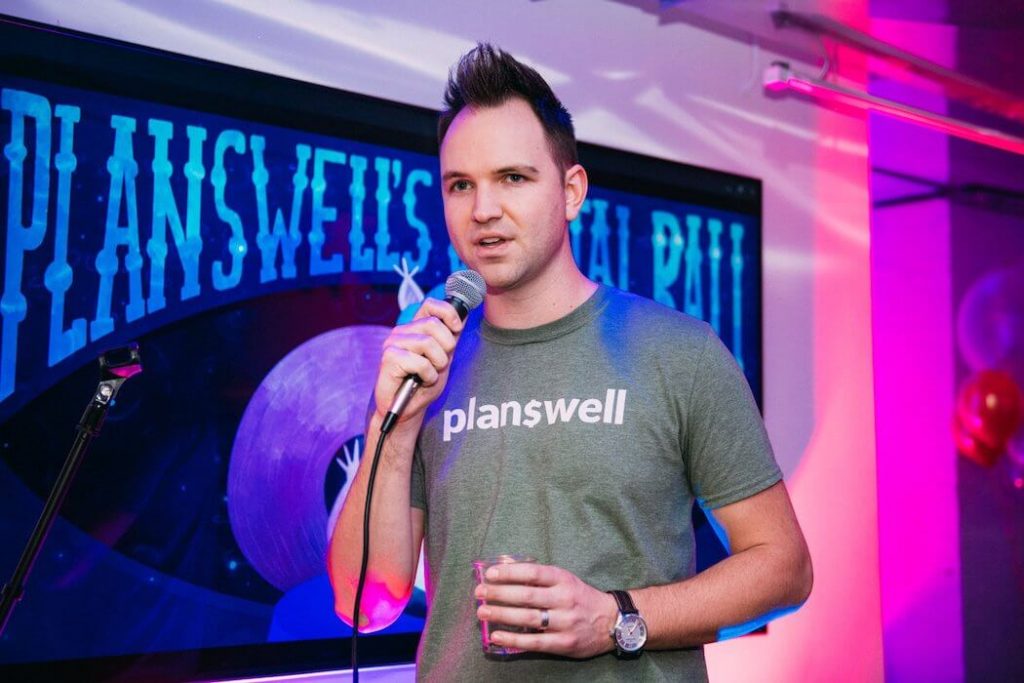In an email to investors and former employees obtained by BetaKit, Planswell co-founder and CEO Eric Arnold said he is “launching a new, similar company, using the same brand.”
The relaunch comes less than four months after a much-publicized shut down on November 4, following public accusations of sexual harassment of a former employee by a Planswell co-founder.
In the email, Arnold claims that “a few of us” bought the Planswell intellectual property (IP), and that by making “a few quick changes” to Planswell’s business model, they will be able to get the company back up and running and “easily begin to monetize.”
Documents trace a path from Planswell Holdings to Planswell Corp., a journey involving original Planswell co-founders, Mobd Inc., Carrot Insights, and Optimity.
Arnold also notes in the email, which contains a non-disclosure agreement, that Planswell is looking to raise a new funding round for the recently formed Planswell Corp. Documents obtained by BetaKit show that Arnold is the director and administrator of Planswell Corp.
Speaking with Arnold today, the CEO told BetaKit that the new Planswell Corp. had been formed in partnership with Scott Wetton, a Planswell co-founder, and Craig Savolainen, a former employee of the original Planswell.
The email, sent out today, shortly follows Planswell’s website returning online on Tuesday. The website offers the same financial services, domain name, and user interface as the past iteration of Planswell, but now lists Planswell Corp. as the incorporated owner. Planswell formerly ran under the incorporated names Planswell Inc. and Planswell Holdings Inc.
RELATED: Anonymous Medium post raises allegations of sexual harassment at Planswell
Documents obtained by BetaKit trace a path from Planswell Holdings to the relaunch under Planswell Corp., a journey that involved original Planswell co-founder Eric Rogness and his company Mobd Inc., IP assets of bankrupt startup Carrot Insights, and Toronto-based wellness startup Optimity.
Planswell bankruptcy and sale
Planswell Holdings filed for bankruptcy on November 25, a few weeks after announcing that it was shutting down. While Arnold attributed the demise to “a social media storm” brought on by the sexual harassment allegations in an email to investors, internal company documents obtained by BetaKit from August 2019 outlined heavy annual losses for Planswell, with the company projected to be underwater by September 2019 without additional financing.
An internal audit conducted by Sun Life revealed that the obtained Planswell data had little value, and would not be proceeding with its use.
Arnold told BetaKit at the time that the sexual harassment allegations effectively killed bridge financing and business opportunities in “eight different countries” that would have kept the company afloat.
Bankruptcy filings obtained by BetaKit show Planswell Holdings listed $610,893 in liabilities and $159,000 in claimed assets. Over half of Planswell Holdings’ listed liabilities, some $350,000, were owed employee wages.
Of Planswell Holdings’ listed assets, $89,000 was debt due to the company via the YMCA ($15,000), Sun Life ($30,000), and CRA HST input tax credits ($44,000), of which the company expected to receive $74,000. Bankruptcy filings listed Planswell Holdings’ property assets in three groups: trade fixtures and equipment (at an original cost of $30,000), intellectual property ($150,000), and Carrot Rewards’ code ($20,000), which the company expected to produce $85,000 in a sale of assets.
Planswell Holdings convened its first meeting of creditors on December 11, 2019, the date at which all tender agreements for the company’s assets were due. Documents obtained by BetaKit lists those assets in three lots: Carrot Rewards’ user data, Planswell’s code and user plan data, and Planswell branding, which included company logo and website.
RELATED: Planswell CEO attributes company downfall to “social media storm” in investor email
Documents obtained by BetaKit also note that the sale of Planswell’s code and user plan data was non-exclusive, as Sun Life owned a copy. Sun Life had been an investor and partner to Planswell, having entered into a pilot project with the startup in 2018. In December of that year, Sun Life contributed $4 million in warrants to Planswell, giving the financial services institution an approximate 10 percent ownership stake in the startup, according to documents obtained by BetaKit.
BetaKit has learned that an internal audit conducted by Sun Life revealed that the obtained Planswell data had little value to the company, and it would not be proceeding with its use.

According to information obtained by BetaKit, all three of Planswell Holdings’ lots were sold to a company by the name of Mobd Inc. BetaKit has yet to confirm the terms of the sale.
Mobd Inc. is a software company owned and founded by Eric Rogness, the co-founding CTO of Planswell. Rogness was later replaced as CTO, and moved to a product and enterprise sales position.
Information obtained by BetaKit related to the bankruptcy proceedings confirms that one of the lots was then quickly resold by Mobd Inc. to another company, Optimity. BetaKit has also obtained an email from Rogness confirming that his company purchased the assets out of bankruptcy and sold the remaining Planswell Holdings assets to a newly formed company started by Eric Arnold.
Government of Ontario documents confirm that Arnold incorporated a company named Linearxy Inc. on November 11, 2019, just one week after publicly announcing Planswell would shut down, and two weeks before Planswell Holdings officially filed for bankruptcy. According to those documents, Linearxy Inc. was renamed Planswell Corp. on January 20, 2020.
Planswell’s B2B Play
Multiple sources have indicated to BetaKit that Arnold and Rogness have been working on the new iteration of Planswell in recent months. Those sources, who spoke to BetaKit on condition of anonymity, claimed that in multiple conversations Arnold and Rogness hinted at building out what is essentially a Planswell 2.0, but with a focus on B2B rather than the original company’s B2C offerings.
The email from Rogness obtained by BetaKit claims that he decided to no longer be involved following the sale of the company assets to Arnold. In a statement to BetaKit following a request for comment, Rogness claimed to have “nothing to do with the relaunch of Planswell.”
“I am neither a founder, shareholder, employee, investor, director or advisor,” Rogness said.
One source speculated that re-purchasing Planswell’s original assets would be the “path of least resistance” for Arnold.
Prior to shutting down in November, Planswell had been working on international expansion and claimed to have inked deals with a number of international financial players. In January 2019, Arnold boasted that Planswell was in the early stages of expanding into 12 countries across Europe, Asia, and Latin America.
An August 14 email from Arnold to investors obtained by BetaKit noted that Planswell was “doing quite well,” highlighting several milestones, such as recent expansions into Hong Kong, the Philippines, and Germany. In his email to investors one day after Planswell publicly shut down, also obtained by BetaKit, Arnold noted that the company had just signed several international expansion agreements.

In Canada, Planswell operated as a B2C company offering insurance, mortgages, investing, and financial planning services. Arnold had previously hailed Planswell’s platform as a way of attracting a younger, millennial generation to services they might not traditionally apply or qualify for. The company’s platform worked essentially as a lead generator: once consumers filled out its planning tool, Planswell would sell insurance, mortgages, etc., through third-party providers.
For its international deals, Planswell pursued a B2B approach, white-labelling its financial planning engine to other financial services and insurance companies around the world. According to sources familiar with the company’s plans, this model was working well in some international markets.
According to these sources, the initial development of Planswell’s recommendation and planning engine required significant investment, but that spinning the engine back up could be done at a minimal cost. One source speculated that re-purchasing Planswell’s original assets would be the “path of least resistance” for Arnold to save and fulfill on the previously signed international agreements.
Speaking with Arnold, the CEO confirmed the new Planswell would take a modified approach. Instead of providing advisor services directly to customers, the company will look to partner with third-party advisors to fulfill that service.
“Our [old] company was a very expensive business model to run,” Arnold said. “We were training a ton of new people and really serving people across all different types of brokerages, which is an expensive business model.”
Arnold said that the company was not working to white-label its planning service, however, with the front-end customer experience (at least in Canada) existing directly through Planswell. Arnold did confirm that the company was looking to restart past agreements with international partners. “Everything that we were working on previously is definitely still potentially in play,” he said.
The Carrot Connection
Mired in the death and rebirth of Planswell is the fate of Carrot Insights, a Toronto-based public wellness and rewards company that shut down in bankruptcy last year. Carrot’s user data has now been sold three times since the company’s Carrot Rewards app shut down in June 2019.
The Carrot Rewards user data was recently announced as acquired by Optimity, a B2B wellness software provider. However, Optimity did not acquire those assets directly through Carrot Insights’ bankruptcy proceedings. Those assets were originally purchased by Planswell Holdings in September 2019, mere weeks before publicly made allegations of sexual harassment rocked the company.
Carrot’s user data has now been sold three times since the company’s Carrot Rewards app shut down in June.
Carrot Insights’ bankruptcy documents do not confirm the actual price Planswell paid for the user data, but note a two-part purchase agreement: a lump sum fee for the user data, and a contingent payment structure based upon the number of Carrot Rewards users Planswell converted to customers within six months of contact. Documentation related to Planswell Holdings’ bankruptcy proceedings lists the cost of acquisition for the Carrot assets at $20,000.
Planswell’s purchase of the Carrot assets was led by Harry McLaughlin, the company’s former VP of strategy. McLaughlin was also in charge of ‘Skunk Works’ projects at Planswell, where he “tested new channels of acquisition, new business models, new product lines, [and] new marketing approaches.”
Speaking with BetaKit earlier this year, McLaughlin explained that Planswell eventually planned to “fire up” the Carrot assets it had obtained. However, that plan never came to fruition.

“I really liked the assets, I thought it was really valuable, and I always thought it was a shame for it to go to nothing … there was certainly some value there,” said McLaughlin. “But then Planswell went bankrupt for a whole slew of other fun reasons. So now, poor Carrot was double bankrupt.”
Information obtained by BetaKit confirmed that the Planswell Holdings lot containing the Carrot assets were sold again to Optimity after being acquired by Mobd Inc. (McLaughlin, Planswell’s former VP of strategy, joined Optimity as a strategy and growth consultant in November).
RELATED: Carrot Rewards shuts down app, files for bankruptcy
Optimity’s CEO Jane Wang told BetaKit that Optimity had an interest in Carrot’s assets at the time of the company’s bankruptcy. Court documents confirm that Carrot had received interest from prospective purchasers prior to its sale to Planswell, but nothing came to fruition.
Wang also told BetaKit that Optimity attempted to purchase the Carrot assets as part of Planswell Holdings’ bankruptcy proceedings, but was informed by trustees that the company was outbid. Wang was then contacted by Rogness about purchasing the Carrot assets from Mobd Inc. Optimity then purchased the assets from Rogness’ company. Wang told BetaKit she was unaware that Rogness was a co-founder of the original Planswell.
Wang would not confirm the purchase price of Carrots assets from Mobd Inc., but indicated that it was higher than the original price paid by Planswell Holdings. BetaKit has also yet to confirm the price of the Carrot assets purchased from Planswell Holdings by Mobd Inc.
It is also unclear the price Mobd Inc. paid for the other Planswell Holdings assets, and the price of their sale to Planswell Corp.
“I think it’s really unfortunate how things have gone down.”
Speaking with Arnold today provided little clarity on how the deal(s) went down.
Arnold declined to share with BetaKit the purchase price of the Planswell assets, and initially claimed that they had been purchased directly by Planswell Corp. during the bankruptcy proceedings. When informed that BetaKit had confirmation the assets were originally purchased by Rogness’ Mobd Inc., Arnold changed tack, stating that he was not able to discuss the terms due to non-disclosure agreements.
“Everything that we do is under non-disclosure agreements when we do deals like that,” Arnold said. “So I can’t, I’m not legally allowed to discuss the names of companies, but I can say there were multiple groups of people interested in purchasing Planswell, and we were by far the biggest bidder.”
Arnold claimed to BetaKit that past investors and employees in Planswell would receive shares in the new company.
Arnold also told BetaKit that Planswell Corp., which incorporated in November under a different name prior to the bankruptcy filings of Planswell Holdings, was not initially set up with the intention of eventually purchasing back the Planswell assets. Arnold claimed the company was set up for another project with a company that eventually fell through.
When pressed as to why he would start a company so soon after publicly announcing the shutdown of Planswell but prior to formally filing for bankruptcy, Arnold said, “I stopped being employed in October, so I started looking for my next thing just like everybody else.”
Despite claims of being the highest bidder for Planswells assets, Arnold could not confirm with BetaKit that the purchase price was enough to cover Planswell Holdings’ $610,000 in liabilities. “I don’t know the answer to that, that’s not something I’ve kept up to speed on,” he said (BetaKit has obtained a statement of affairs for Planswell Holdings signed by Arnold as part of the bankruptcy process, declaring that the assets and liabilities referenced above were “full, true, and complete” to the best of his knowledge). Arnold did claim, however, that Planswell’s employees were paid in full for their owed wages as part of the federal Wage Earner Protection Program (BetaKit has not yet verified this claim with former Planswell employees).
Going forward, Arnold said he is working on ensuring prior employees and investors in Planswell Holdings receive shares in the new Planswell Corp. to “make people whole.” Arnold claimed these people would not have to repurchase shares in the new company, and that their value in Planswell Corp. would actually be greater, as the company would be issuing 10 percent fewer shares (it is noteworthy that Sun Life’s stake in Planswell Holdings was approximately 10 percent).
“We just launched today,” Arnold said. “I’m working with 120 different people, and lawyers and accountants, on how we’re setting this up, so it’s not finalized yet. I just started reaching out to people today about that. I’m very excited to be able to support the 120 people who either worked at the company when it was going down, or invested in us, and bring them along.”
When asked if Planswell’s public demise, and detailed reporting on the claims of sexual harassment and toxic culture at the company, had tarnished the Planswell name publicly, Arnold responded, “I think it gives us an opportunity to redeem ourselves.”
“We are doing amazing work,” he continued. “We are helping people. Already there’s people coming in and making plans and asking us for help with their finances, and it really feels good to be doing that. I think it’s really unfortunate how things have gone down, and me having a front-row seat to this, I’m hoping that we can redeem the name and redeem the story and mission we’ve been on.”
“I’m really excited about Planswell coming back,” Arnold said. “There’s a huge opportunity to help Canadians.”
With files from Isabelle Kirkwood
Update (02/27/20): This story has been updated with additional statements from Eric Rogness, Eric Arnold, and Jane Wang.


